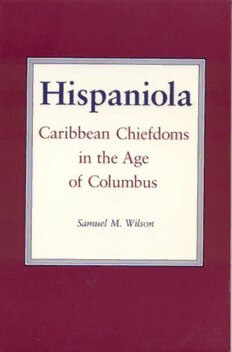Download Hispaniola: Caribbean Chiefdoms in the Age of Columbus PDF Free - Full Version
Download Hispaniola: Caribbean Chiefdoms in the Age of Columbus by Samuel M. Wilson in PDF format completely FREE. No registration required, no payment needed. Get instant access to this valuable resource on PDFdrive.to!
About Hispaniola: Caribbean Chiefdoms in the Age of Columbus
In 1492 the island of Hispaniola was inhabited by the Ta&iactue;no, an Indian group whose ancestors had moved into the Caribbean archipelago from lowland South America more than 1,500 years before. They were organized politically into large cacicazgos, or chiefdoms, comprising 70 or more villages under the authority of a paramount cacique, or chief. From the first voyage on, Columbus made Hispaniola his primary base for operations in the New World. Over the subsequent decades, disease, warfare, famine, and enslavement brought about the destruction of the Ta&iactue;no chiefdoms and almost completely annihilated the aboriginal population of the island.This book examines the early years of the contact period in the Caribbean and in narrative form reconstructs the social and political organization of the Ta&iactue;no. Wilson describes in detail the interactions between the Ta&iactue;no and the Spaniards, with special attention paid to the structure and functioning of the Ta&iactue;no chiefdoms. By providing additional information from archaeology and recent ethnography, he builds a rich context within which to understand the Ta&iactue;no and their responses to the Europeans.The Ta&iactue;no are especially important in a New World context because they represent a society undergoing rapid sociopolitical change and becoming more complex through time. The early contact period on Hispaniola gives us a rich ethnohistorical glimpse of the political processes of a complex New World society before (and during) its destruction brought about by the arrival of the Europeans. Samuel M. Wilson is Assistant Professor of Anthropology at the University of Texas at Austin.
Detailed Information
| Author: | Samuel M. Wilson |
|---|---|
| Publication Year: | 1990 |
| ISBN: | 9780817381004 |
| Pages: | 185 |
| Language: | English |
| File Size: | 4.877 |
| Format: | |
| Price: | FREE |
Safe & Secure Download - No registration required
Why Choose PDFdrive for Your Free Hispaniola: Caribbean Chiefdoms in the Age of Columbus Download?
- 100% Free: No hidden fees or subscriptions required for one book every day.
- No Registration: Immediate access is available without creating accounts for one book every day.
- Safe and Secure: Clean downloads without malware or viruses
- Multiple Formats: PDF, MOBI, Mpub,... optimized for all devices
- Educational Resource: Supporting knowledge sharing and learning
Frequently Asked Questions
Is it really free to download Hispaniola: Caribbean Chiefdoms in the Age of Columbus PDF?
Yes, on https://PDFdrive.to you can download Hispaniola: Caribbean Chiefdoms in the Age of Columbus by Samuel M. Wilson completely free. We don't require any payment, subscription, or registration to access this PDF file. For 3 books every day.
How can I read Hispaniola: Caribbean Chiefdoms in the Age of Columbus on my mobile device?
After downloading Hispaniola: Caribbean Chiefdoms in the Age of Columbus PDF, you can open it with any PDF reader app on your phone or tablet. We recommend using Adobe Acrobat Reader, Apple Books, or Google Play Books for the best reading experience.
Is this the full version of Hispaniola: Caribbean Chiefdoms in the Age of Columbus?
Yes, this is the complete PDF version of Hispaniola: Caribbean Chiefdoms in the Age of Columbus by Samuel M. Wilson. You will be able to read the entire content as in the printed version without missing any pages.
Is it legal to download Hispaniola: Caribbean Chiefdoms in the Age of Columbus PDF for free?
https://PDFdrive.to provides links to free educational resources available online. We do not store any files on our servers. Please be aware of copyright laws in your country before downloading.
The materials shared are intended for research, educational, and personal use in accordance with fair use principles.

